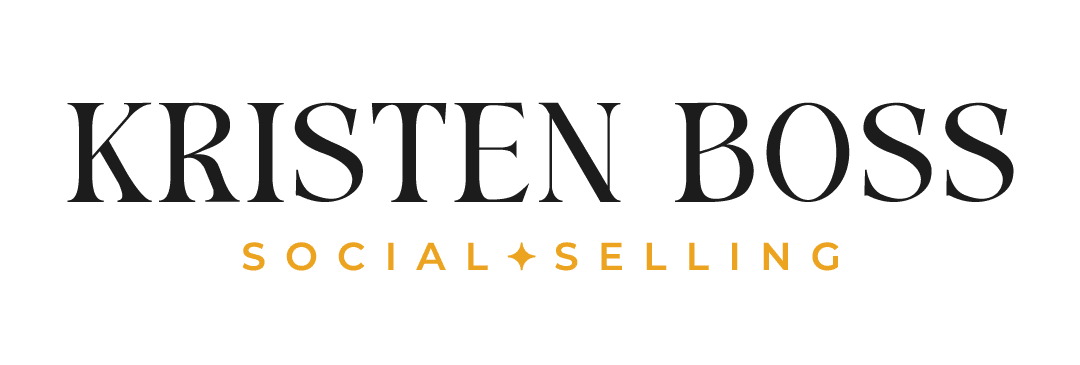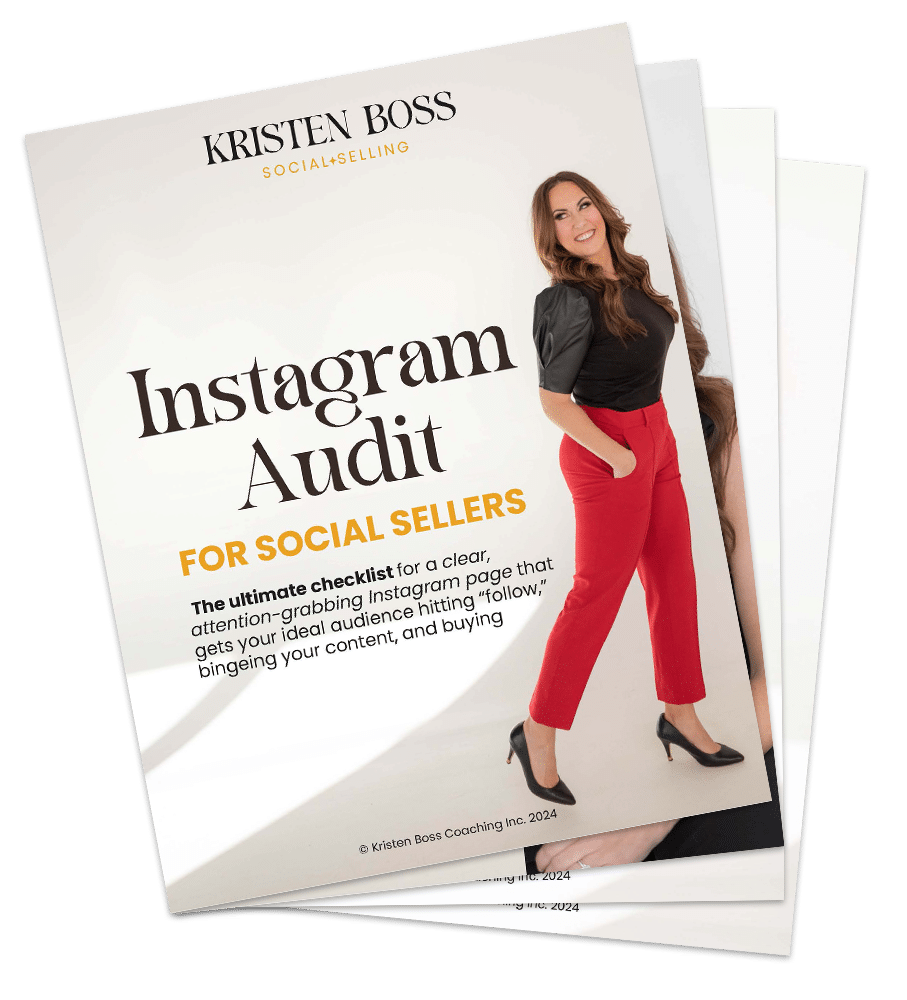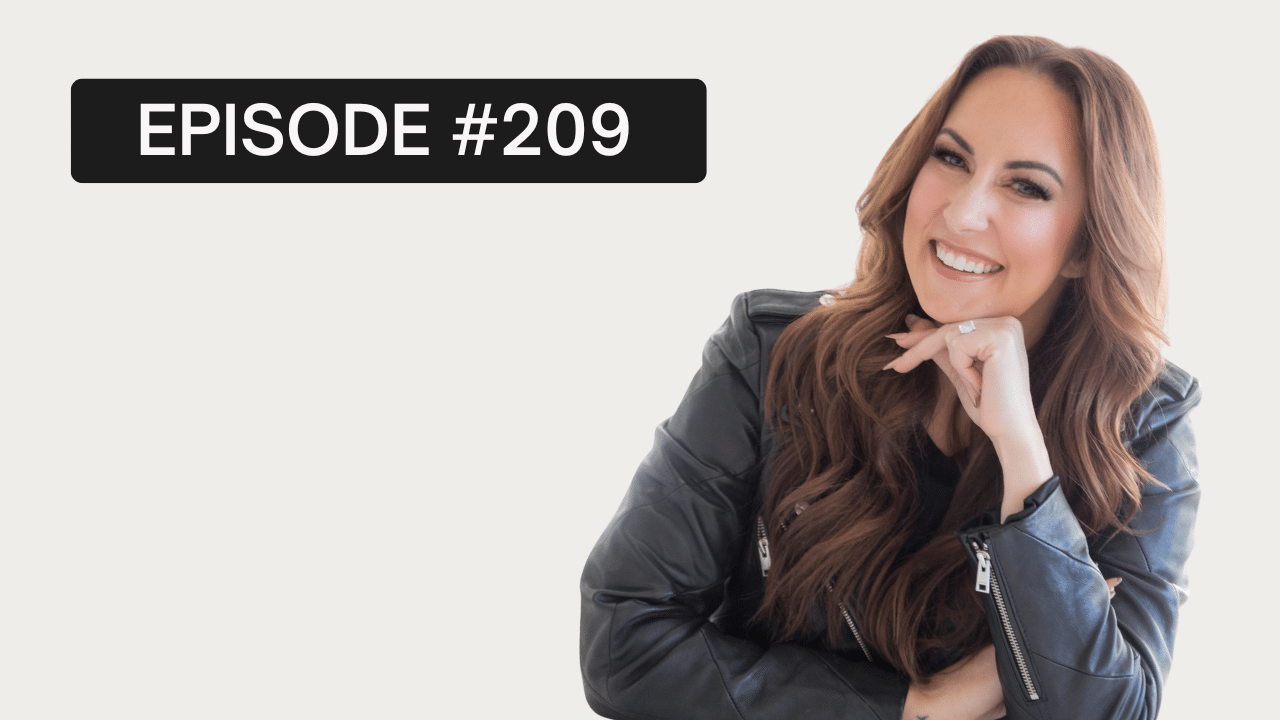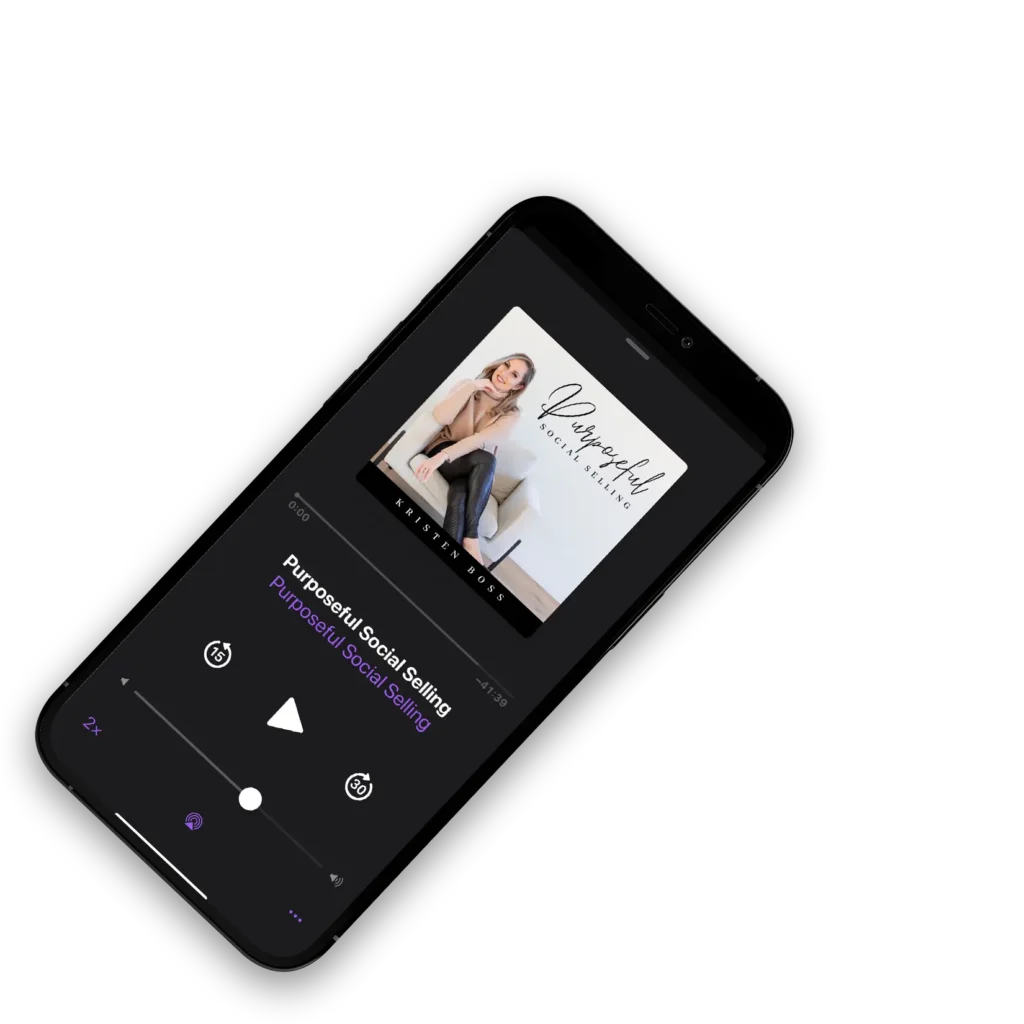As an online entrepreneur, you’re starting from the ground up to build your business. For those of you coming from other career backgrounds, it can be a challenge to realize that there’s no handbook to tell you how to operate. Not knowing whether your decisions are right or wrong can leave you feeling overwhelmed, confused, and stuck.
That’s where building self trust comes in.
Here’s what Kristen wants you to understand about trusting yourself to make important decisions in your social selling business:
- What it really means to trust yourself
- The problem with labeling your decisions as right or wrong
- Why it’s okay to experience negative emotion
- The reason why your brain actually PREFERS indecision
- The secret to making committed decisions
- How self trust leads to faster progress
Making confident decisions is the foundation of any successful business. Stop staying stuck in fear, anxiety, and doubt. Learn to trust that you can make the important decisions and you’ll be able to handle whatever happens next – regardless of the outcome.
Interested in Kristen’s exclusive mastermind for six-figure earners in the network marketing industry? Get all the details and join the waitlist here.
If you’re ready to learn the simple process of running your social selling business online, you have to check out Kristen’s live group coaching program! The Social Selling Academy: www.thesocialsellingacademy.com
Do you have a question about network marketing? Kristen can help! Drop your question here and she just might answer it live on the podcast: https://kristenboss.com/question
Download the 3-Day training SUSTAINABLE SUCCESS for SOCIAL SELLERS where Kristen will be going to be giving you the exact tools you need to have success in today’s social selling landscape. Without creating more confusion, complicated algorithms, frustrating funnels, or sales scripts. Check it out here.
Transcript of Episode #35: Building Self Trust:
Kristen Boss (00:05):
Welcome to purposeful social selling with Kristen Boss. I’m your host, Kristen Boss. I’m a mindset and business coach with more than 15 years experience in both the product and service based industry. I believe that social selling is the best business model for people wanting to make an impact while they make serious income. This is the podcast for the social seller, who is tired of feeling and authentic in their business and desires to find a more purposeful and profitable way of growing their business in today’s social media landscape. In this podcast, you will learn what it takes to grow a sustainable business through impactful and social marketing. It’s time to ditch the hustle and lead from the heart. Let me show you the new way you bosses happy Monday. I just want to say thank you again for
Kristen Boss (00:53):
Tuning in every week. Joining us. We have new listeners every week, and I just want to say thank you. I love serving you. I love that you are sharing with your, with your friends, with your sideline, your teams. I love seeing and hearing about breakthroughs you have through the podcast. And I would love if you could, if you haven’t left a review yet, I would love it. If at the end of the show today, if you could just take a minute and leave a review, leave a rating, it helps the podcast get out and be more known because we need it in the hands of more people to elevate this industry. Am I right? And I love how many of you are excited about where this industry is going. And I don’t say this lightly, the social selling industry, I believe is on another wave of massive growth industry wide because people are now seeing the lure of growing businesses online.
Kristen Boss (01:52):
Now, more than ever. It’s now socially normal for people to be working from home on their computers on zoom. And people want that flexibility. They want to have their own hours. And not only that, it seems like everybody online today is selling something. Whether they are a coach or they’re selling an online course or a digital book or a PDF, or they’re an influencer, and they have an Amazon list, listen, everybody is selling something. Now it is so normal, which means now more than ever, people are going to be receptive to hearing about what you do in this industry. So I just want to encourage you today to be bold and talking about the social selling industry and inviting people into a different story, let them know it’s being done a different way. And I promise you, the person that’s been watching you for a while, that’s maybe thought I like the idea of having a business from home.
Kristen Boss (02:53):
I liked the idea of making my own hours, but maybe they’ve seen how this industry has been done in the past. And they wrote it off. They need to know there’s a new way of doing it. They need to know it can be done differently and they don’t know what they don’t know. So you have to tell them it’s my little pep talk today. Listen, if you want a business full of product takers, talk about the, if you want a business full of women or people who want to work a business, you’ve got to talk about the business. I actually coach on that a lot. A lot of people are like, Hey, I have a team full of product takers. I’m like, why aren’t you talking about the business at all? They’re like, no. Yeah. Talk about the business you attract what you talk about.
Kristen Boss (03:38):
That’s actually not the topic for today, but I just thought I would give a little Monday pep talk for you just to get you on the path to excitedly talking about this business and this opportunity, because it truly is one of the best business models. Actually, I’m getting super excited because in just a couple of weeks, I am going to be kick-starting my six figure earner mastermind. It’s the purpose and profit mastermind. And this has been a dream in my heart for so long to create a container for the top leaders in this industry, where I am going to be doing intensive coaching with them to help shape them into the new leaders, into the next generation of leaders for this industry, they’re going to be setting the tone and setting the pace for where this industry is going. They all interviewed for a position.
Kristen Boss (04:34):
They talked with me, I asked them some pretty intense questions and it was a big investment for them. And these are women that decided my business and my personal development is worth this investment. It was a $10,000 investment. It’s not a small one, but it requires them to show up in such a way that they take themselves. Seriously. I see a lot of times a six-figure earners is, is they have a lot of imposter syndrome around their leadership. They might have a large organization of women under them, but they don’t feel like a leader, but when you join a mastermind like this, when in the container that I’m going to have them in for six months where they’re going to be working with me and we’re actually going to be doing a live retreat in Austin, Texas, to kick it off. But over the next six months, it’s all about developing their self concept as leaders in today’s social selling industry and them learning to coach on the same philosophy I teach inside the academy so that they can strengthen their teams, strengthen their leadership, strengthen their influence, and to get them out of management mode.
Kristen Boss (05:39):
I see that with a lot of top earners in the companies there, they’re very caught up in the urgency of the now constantly putting out little fires all day long and they wake up the next day and they’re wondering, oh gosh, I haven’t had a chance to recruit for my own business. I, I’m not focusing on my own business. It’s so easy to feel completely consumed running your team and managing the team at that level. So I’m actually going to be teaching them all the systems and automation and delegation and leadership and coaching in order to truly make them the CEO of their business rather than the manager of their business. Because listen, when you signed up for this business, you were very excited about the time freedom and the financial freedom. But the problem I see as a lot of people at the top, don’t have time freedom.
Kristen Boss (06:26):
And that’s when they start to feel inauthentic promoting the business. Cause they’re like, how do I promote time? Freedom when I don’t experience that myself. And so these leaders that I’m going to be working with for six months, they’re going to learn how to effectively and efficiently run their businesses as the CEO, not the manager and not feel like their business runs them. And so that they can have time. Freedom have boundaries have time with their family, not be burnt out and not be hustling. You guys know how I feel about hustle and it starts from the top down and it’s teaching the leaders how to not hustle and for them to shape a team that is in it for the long run. So I’m super excited. We’re going to be starting that. And listen, if you are just catching this cast and you’re like, no, I, I want to be in that master.
Kristen Boss (07:16):
We’re going to be opening up enrollments again in August for you to apply. So you’re going to want to pay attention. If you’re not on my email list, you’re going to want to get on my email list, but you’re going to want to pay attention. So, because it’s sold out in pre-launch, I sent out one email and applications were full in a day. It will happen again in August. So you need to already be thinking about the investment and thinking about how you want to show up in August. So speaking of that, I’m actually today, I think it’s a really important topic about self-trust because I talk about this a lot with with high earners. I talk about it a lot with students in the academy. And I really believe self-trust is a really important skill to have when we’re growing a business, especially in the entrepreneurial world, because what you’re taught based in the school systems and society and our how we’ve been conditioned to think about business is very different from the entrepreneurial world.
Kristen Boss (08:16):
There is no black and white. There is no rule book for entrepreneurs, which is why even some people that are very successful in the corporate world or a successful in their nine to five, when they move over into the entrepreneur space, it very much feels like the wild west. And if you were someone that loves formulas and step-by-steps and handbooks, and, and tell me exactly what I need to do. Entrepreneurship, building a business online feels very difficult because it is very much the, the wild west of figuring things out and being willing to fail. And a lot of lessons, I don’t think you fail elsewhere as much as we do in the online business world. Like it requires high tolerance for failure to build a business online. And that also requires a high emotional tolerance for failure. I want you to think about, you know, we as women, because a lot of my audiences, like 99% of my audience is women.
Kristen Boss (09:24):
Listen, we have high pain tolerance. And especially when we know we have to get through something, right. And you know, maybe, maybe you’ve had a child and you, and you went through the childbirth that pain and you pushed through that to get to because you wanted to meet and hold that child on the other side. Right? So, so we will dig in with pain tolerance when we know that the outcome is worth it, but I don’t see women having that same mentality with growing an online business. I see them checking out when it’s emotionally painful. I see them wanting to pull back and move away from emotional pain and business. And I’m going to tell you right now, growing a business online is emotionally painful at times. And that’s okay. You experiencing negative emotion doesn’t mean you’re doing something wrong in your business. Oftentimes when we’re feeling fear or shame or defeat or judgment, we think we’re feeling those things because we’ve done something wrong, but it’s not because you’ve done something wrong.
Kristen Boss (10:33):
It’s simply because you are doing something new and you’re learning things about yourself. And any time you’re doing something new, you’re going to experience negative emotions like fear, anxiety, doubt, confusion, overwhelm. That just happens. It’s with the territory. So when you were in that place, when you’re dealing with negative thought, it’s really important for you to acknowledge in the moment, have grace with yourself and realize I’m supposed to be feeling this, these things. I want you to notice how much that might change things for you when you were spiraling and judging yourself for feeling bad. Instead of realizing you’re supposed to feel bad because you’re doing hard, hard things. Notice how different that becomes. Then we feel less crappy about ourselves. Then we’re able to sit with our feelings and process them because we’re not spiraling and judgment and shame. And self-loathing now we’re able to sit with it and see what’s going on.
Kristen Boss (11:33):
And then we’re able to still take action, even when we’re not feeling great. Even when we’re still experiencing negative emotion. I had someone ask me the other day. They’re like, Hey, you know, how do I turn around my emotions on a bad day and work my business? How can I, how can I turn my feelings to want to work my business? Like I think they even asked me like, how do you handle bad days in your business? I’m like, well, bad days happen. So a, when it happens, I’m not shocked. I’m like, oh yeah, bad days happen. Okay. But I’ve learned to work through bad days. I don’t disappear and stop working when things are hard. I learned to sit with the hard and ask myself how, what are small things I can keep doing to move forward? Even when it feels hard learning to still work, even when it feels hard is a vital skill set to have.
Kristen Boss (12:23):
And that’s, and that’s part of what I want to talk about more when with this idea of self-trust specifically when it comes to decision-making because in this, in this business, when you are an online business owner, it is absolutely necessary for you to become a person who is decisive and someone who is decisive means they are quick and efficient with making a decision they’re quick and efficient with making a decision. Whereas on the other side, indecision is when there is fear and confusion and a lot of delay behind making a decision. And I think it’s important to know. I, I do think women particularly struggle with being from decision-makers. I mean, look at how hard it is for us to say no, say no is a decision. And sometimes we feel bad saying no, because we’re afraid of making the person we are seeing no too uncomfortable.
Kristen Boss (13:27):
Or sometimes we feel uncomfortable saying yes to ourselves because we’re afraid of, well, if I’m saying yes to me, then who am I saying no to? So as women, we often try to play both, or we sit in indecision, we delay having to even make a decision. We buffer, we avoid, or we hope that eventually that a crisis or a circumstance or a person will force our decision for us to remove us out of our own discomfort in our indecision. I used to see this a lot when I would have consults with one-on-one coaching. And when people would interview me and this, especially earlier on in my journey, and I would see a lot of people while I was on a zoom with them, when they were deciding whether to work with me, I saw them struggle with decision-making and they would often want to be like, I need to go and think about it.
Kristen Boss (14:24):
But instead of letting them go, because I knew how their brain would work, they would, they would leave. And they would spin out in indecision. And in fear they would talk themselves into the no, because they were afraid. Whereas instead I held space for them. I said, well, let’s talk about it. What’s coming up for you. What is your fear around saying, yes. What is your fear around saying no. And oftentimes they just needed to process all thoughts in a safe way, which by the way, your potentials, when they’re interested in maybe this business, or maybe the products you need to hold space for people making a decision to work, this business is scary for people because some people are like, maybe they’ve done it before and they failed. Maybe they’re afraid of committing to something and letting themselves down. So we just need to hold space for people in they’re making decisions.
Kristen Boss (15:18):
But here’s what I would see. I would see like people, I would, I would work with it where they would think about working with me. I would see them want to delay or defer their decision elsewhere. And they’d be like, well, let me go and talk to my husband about it. I’m like, okay, go talk to your husband about it. However, I want to just talk about what you want, if let’s well, his decision or his thoughts about your decision is a completely different conversation. Let’s just talk about your decision and what you want. And most of the time, the people, I would say that too, they’d feel really uncomfortable. Not because I was forcing them into a sale, but because they were having to face their own thoughts around decision-making because they were, what they were learning in that moment was how to make a decision and trust themselves with their decision.
Kristen Boss (16:15):
And a lot of times, as a coach, even if they didn’t work with me, they would learn a lot about themselves in just that call with how they make decisions. And I would often coach them on this being like, Hey, I just want you to notice how you’re making a decision. What thoughts are coming up for you. I want you to notice what’s coming up for you and how we make decisions here is how we make decisions everywhere in our life. Listen, how you’re making a decision. Like maybe you’re maybe you’re trying to decide if you want to join the academy today, how you are making that decision is how you make other decisions in your life. And we’re going to talk about why decisions feel so hard. We’re going to talk, we’re going to really unpack that. But a lot of times I do see people waiting for crisis, a circumstance or a person to force the decision for them. So it removes the burden off of them because when we are in indecision, it does feel burdensome. It feels heavy. This is when people say I’m stuck. Stuck is when we are literally sitting in indecision. It’s when we are sitting, knowing what we should be doing, and we’re not taking the actions to do it.
Kristen Boss (17:33):
Indecision is actually comfortable for your brain because it means you’re staying put, because if you say, yes, you have to take action. If you say, no, you have to take action. But in decision keeps you exactly. You are because there’s no risk. You stay. And that’s where stuck happens. There’s no risk. You’re not making progress. You’re not moving forward with anything. But in some ways it feels safe because if there’s no risk, then it feels predictable. A lot of you know how to operate in your indecision. Maybe it’s just a way of being for you. And I hope after this podcast episode, like, even if you never work with me inside the academy or in my mastermind, maybe this one episode will be life-changing for you with just learning, to trust yourself with decisions. His, like I said, how you make decisions in one area is how you make decisions and many other areas of your life in order for you to be a decisive person, it does require high levels of self-trust. We’re going to talk about what you would need to trust yourself with. It also was a willingness to see it through, to go through with the decision and follow it all the way to the outcome.
Kristen Boss (18:59):
And a lot of times, the reason why we don’t make a decision is because we don’t see the outcome ahead of time or the outcome isn’t predictable. It feels out of our control. And because we can’t see it, we have a hard time trusting ourselves to handle the outcome. I see that happen for a lot of people. I think there is a lot of fear of, I don’t think I can either emotionally handle the outcome or what if I don’t have the tools to handle the outcome? What if I’m disappointed? It’s often the fear of the outcome either way, but what creates more fear around the outcome is when we are putting a lot of weight on the decision when we are labeling the decision as a bad or a good decision. So here’s the problem with that because I see a lot of people saying, I just want to make the right decision.
Kristen Boss (19:54):
As soon as we label something, the right decision, then we’re also saying that there is a wrong decision. And as a human, with a human brain, you want to avoid making the wrong decision because the wrong decision means an outcome. I don’t like. So now when it comes to making a choice, now you feel pressure to find the right decision. Now there’s even more anxiety and more fear around making a decision because now you have to make the right one. And oftentimes the reason why there’s a right, right decision is I realize, or I see people putting a lot of weight or they are drama, timing, the consequences of a right or a wrong decision. Often the wrong decision, like, oh no, if I don’t make the right decision, the wrong decision, and they will dramatize what they think the wrong decision will cost them.
Kristen Boss (20:54):
So oftentimes I’ll see people, they will dramatize the outcome of a decision by saying like, well, my, my business, my whole business is relying on this. This is my one chance I have to get this right. Or else people aren’t going to take me seriously. If I do this, then I’m going to have to go and do that. Like if I don’t hit this financial goal, then I’m going to have to go back to my nine to five and they’re painting them, going back to the 99 to five as the worst thing in the world that could possibly happen to them.
Kristen Boss (21:29):
Where, and, and I would actually challenge if that’s you, if you’re sitting there and saying, oh my gosh, if I don’t make this happen, or if this decision goes wrong, I’m going to have to go back to my nine to five. And I just want to offer you. So what if you do have to go to your nine to five, what if that’s not the worst thing in the world? So what if you go to your nine to five and you, and that allows for you to be making steady, predictable income while you are learning and acquiring a new skill in the online business world, that feels like the wild west, where you are having to acquire brand new skills. Listen, it’s not just about selling a product and getting people to join a team. You’re learning to be an online business owner. It’s so much more than just selling a product you’re learning.
Kristen Boss (22:13):
You’re having to be the expert at marketing. You’re having to be a content writer. You’re having to be a sales person and a coach. You’re literally wearing 10 different hats. So I want you to go easy on yourself when you were learning all these brand new skills in a new way, especially if you’re new to the field. If you’ve never like, listen, if you were a teacher, you didn’t have to market yourself. As a teacher have to, you didn’t have to like do a Martin, take a marketing class and sell people. You just got to show up. If you were a nurse, you didn’t have to market yourself. There’s so many things in life. Like a lot of you come from other professions and into this industry, and you have a lot of judgements about yourself when it doesn’t click for you right away, you are literally learning a brand new skill.
Kristen Boss (23:06):
If you were to do any other business, if you were to run an Etsy shop or a online course, you would be like, okay, yeah, you’re right. I got to figure out a low, you know, you’d probably be like, oh, logo, design, branding, marketing, content, production, and inventory. You’d have a lot more grace for yourself over there. But we, we tend to sometimes forget that a network marketing business or a social selling business still requires you to learn a lot of new business skills. So again, it’s, it’s this, I see people dramatize, what will happen to them if they make the quote, not decision or the wrong decision that the world’s going to fall apart.
Kristen Boss (23:51):
So in order for you to become a decisive person, you, you have to stop believing that there’s the right decision. That or that there’s the optimal decision. Because even that it’s still puts pressure on you. And if you don’t trust yourself to handle the outcome, then you’re going to continue to stay in, in decisions. But here’s the thing. Indecision is costly because it eats up our most precious resource, which is time to, to think about that. The time you spend in confusion and doubt and weighing your options and researching and calling 50 friends and getting everyone’s opinions only for you to feel even more confused and for you to listen to 50 more podcasts and for you to feel even more overwhelmed, because now your brain has so much information to sort through. Now, you’re just feeling like you you’re shut down and then you starting to feel defeated. Then think I can’t make any sense decisions. So that’s all last time when you could have spent that time doing and taking action.
Kristen Boss (25:06):
Listen, there is no right decision, a decision that you commit to making right for you. And I’m not talking about moral or spiritual decisions here. I’m not talking about like decisions that harm people. I’m talking about decisions when it comes to your business. This is why it’s so important to know your core values. Why it’s important to have a mission statement, because you do want to line up those things with how you make decisions. But again, you need to hear this again. There is no right decision, just as a decision you commit to making, right? Even if it’s not the outcome you wanted, it can still be the right decision because you learned such valuable lessons. I learned, I have learned, learned a million lessons in this business and things I would do differently. I literally could write a handbook. As a matter of fact, most of the materials I teach to my students is me going out testing and trying a million things to see what actually worked.
Kristen Boss (26:26):
And just so you know, the organic marketing that I teach is what yielded a quarter million dollars in sales organically for me. So I knew it was absolutely proven when I was teaching my students. This I’m like, it absolutely works because I’m going to tell you everything I did, that was wrong. Here’s all my failures. Listen, when you are hiring and working with a coach, you are not paying them for their successes. You’re paying them for all their failures and the lessons that their failures taught them so that you don’t have to make the same failures. Imagine how much time you save when you’re not having to make a million different mistakes that a coach could prevent you from. But still even if you make a million mistakes, it’s not a problem. Here’s a great example of where I see people spinning out with, with decision and confusion and decision and confusion as with a niche.
Kristen Boss (27:21):
Like people think like there’s the right niche out there. There’s the right target market. There is not, there is just the niche you commit to, you go all out in and you offer the value and you commit to making a right and you have your own back. I’m going to talk more about having your own back in a second here, but I want you to notice that indecision costs you time and you cannot get time back. Decisions are only scary because of what we make decisions mean about us or the outcome of the decision, mean again, that whole making the right decision. And by the way, making a good decision, doesn’t automatically make you a good person. Just like making a bad decision. Doesn’t make you a bad person. You’re just a person who makes decisions. And you commit to seeing that decision and evaluating the decision at the end and saying, do I like that decision?
Kristen Boss (28:21):
Would I make the decision again? Or would I do it differently? It’s just about making a decision, implementing the decision and then evaluating your decision and then moving forward again. And again and again, but here’s the thing I see. So many people afraid of the outcome. They’re afraid of experiencing failure, disappointment, or they’ve labeled themselves as bad decision makers. But you are just, it’s not a bad decision. It’s a decision that you learned, maybe tough lessons with, but you have to stop thinking. I can’t make decisions. I’m not good with making decisions. I hear a lot of people say that I’m not good with making decisions. What you’re actually saying is I don’t trust myself. I don’t trust myself. Why is that? And do you want to know how to trust yourself is deciding ahead of time, how you’re going to treat yourself when you reach the outcome of your decision, you have to decide ahead of time.
Kristen Boss (29:31):
How am I going to treat myself? What self-talk am I going to use? What am I going to say about myself? That’s what having our own bag is. It’s saying like, Hey, I’m going to try this. And if it fails, I’m going to be okay. And here’s my plan of what I’m going to do. And here’s how I’m going to choose to think about myself. This is why you are not setting goals. Just so you know, setting a goal is making a decision. It’s a decision that sane, I am laying down an intention to make this happen. And I’m going to commit to this decision, but I see people shying away from making that decision because they are terrified that they won’t be able to hit the goal or reach, or yeah, I’m going to say hit the goal. And they’re so afraid of experiencing the negative emotion around the miss goal.
Kristen Boss (30:25):
The only reason you’re afraid of experiencing the negative emotion of a missed goal is because you are so mean to yourself. When it happens, you say things to yourself, like I suck. Why am I doing this? I’m no good at this. Everybody’s better at this than me. What’s wrong with me? I’m such a loser. I have the wrong niche. I’m not funny enough or popular enough, or I don’t have enough followers. I’m not savvy enough, outgoing enough. I have the wrong personality type. You’re so mean to yourself. And because your brain knows that you’re going to be mean to your brains. Like we’re not making a decision because I know how mean you’re going to be to me if we miss that goal. So having your own back is choosing to love yourself and be proud of yourself. No matter the outcome. And that’s also making a decision is really about being willing to surrender control and still choose to be okay.
Kristen Boss (31:20):
Some of you live this life of, I will feel okay if I know I have control. If you continue that story and that pattern for you business is going to continue to be a miserable learning curve for you because there is no predictability with online business. Like, yes, like even I have projected like projections for this year. I have projections of what, the thing, but there are there’s variables and I have to be okay with variables and have my own back and realize things happen. And I decide ahead of time who I’m going to be when those variables happen, the biggest difference between indecision or in decisiveness versus decisiveness. The thing that separates them is speed. The thing that separates them is speed. And we can move a whole lot faster. If we put down our doubt and our fear, and we have self-trust, we’re going to trust ourselves to handle the outcome no matter what, then we’re able to take quick action and listen, success loves the quick action taker.
Kristen Boss (32:41):
Imagine what happens if you have two different people, one person, and they’re both given the same decision person a is going to think about it. They’re going to weigh their options. And they’re freaking out about what that means. And they, and they they’re like, I’m going to go do some research. I must not have all the information because I feel scared. I’m going to go talk to a few people. Talk to my husband, maybe read a book podcasts. So person a chooses that person B takes about 36 hours weighs the option and decides I’m going to be okay. I’m going to go for it. And they start taking action in let’s say in 30 days, let’s fast forward person. “A” Is still deciding person “B” has taken the action and now has three lessons under their belt. And they’re like, oh man, that’s really good to know person a is thinking, maybe all tries something.
Kristen Boss (33:36):
They play small. Oh no. You know what, let me think about it. Some more, some people stay in indecision for months. So person A still an indecision person B is already on version two of their first decision and they’re moving forward. And here’s the thing in 90 days, if person a is still thinking about it, person C has now tested it three times has 10 more lessons than person a and has also made progress. They were given the decision, the same decision. And in the 90 day timeframe, one person has made a lot of progress with a lot of failure, but they’ve made a lot of progress and money and the other one has done nothing but added to their confusion and stayed stuck. And I’m really convinced me and my good friend, Samantha, we both built, you know, really huge coaching businesses. And we watched a lot of our friends and, and peer mastermind members.
Kristen Boss (34:43):
And in this huge coaching group, we were in with 56 other coaches. And one of the things we noticed was the coaches who built the fastest in their business were the ones that were making the fastest decisions that were extremely quick to implement. They felt all the feels. We coached ourselves through all the pain and all the scary things. And then we made decisions and decisions are uncomfortable because it does require action that either requires you to tell someone, no, which can feel hard, or it requires you to say yes to something that’s going to require you to do uncomfortable things that feel new and hard to you. Listen, decisiveness requires courage, courage of how we are going to choose to think of ourselves at the other end of the other side of our decision and how we are going to choose to think of ourselves no matter what others think of us on the other side of the decision.
Kristen Boss (35:48):
Sometimes we’re okay with how we think of ourselves. And sometimes we’re terrified of how others will think of us with our decision and having your own back means loving yourself with your decision and then not letting what others think of your decision, influenced your decision. Having your own back says, I trust myself to experience the outcome, to handle it, to believe I have the resources and the emotional fortitude to get the result I want or the lesson I need. I hope this was helpful for you today. Maybe you’re going to have to go back and listen a few times and take some notes. I have a feeling I’m going to go back and relisten to myself and be like, dang, I need to remind myself of that. Oftentimes I’m preaching to myself, but this is one of the most valuable skills I have learned over the past few years is learning to be a very decisive business owner who has her own back.
Kristen Boss (36:54):
So how can you have your own back today, maybe for you that is joining my academy. Maybe you have been sitting in indecision for long enough. Maybe it’s been 90 days and maybe there’s this story you have about joining fear that, oh no. What if I join? And I let myself down, I’ve done programs before and I haven’t shown up again. That’s why it’s a lifetime program because I know that happens. And I want people to be able to decide at any time to recommit show back up, get coaching. And we coach on this a lot in the academy we coach on having your own back and what that looks like when it comes to pursuing a goal, talking to a team member, member recruiting, committing to a niche, adding values, showing up consistently building a strong profitable business requires having your own back. So if today, having your own back is joining the academy. We’ll be glad to have you in there, but too, but maybe that’s not it maybe today having your own back is writing that post we’re having that conversation
Kristen Boss (38:01):
Or making that decision that feels so hard and saying, I’m going to be okay, no matter the outcome. And we’ll catch you next week. That wraps up today’s episode. Hey, if you love today’s show, I would love for you to take a minute and give a rating with the review. If you desire to elevate the social selling industry, that means we need more people listening to this message so that they can know it can be done a different way. And if you’re ready to join me, it’s time for you to step into the Social Selling Academy, where I give all the tools, training, and support to help you realize your goals
Kristen Boss (38:39):
In the academy. You get weekly live coaching so that you are never lost or stuck in confusion. Whether you are new in the business or been in the industry for awhile. This is the premier coaching for the modern network marketer go to www.thesocialsellingacademy.com to learn more.










